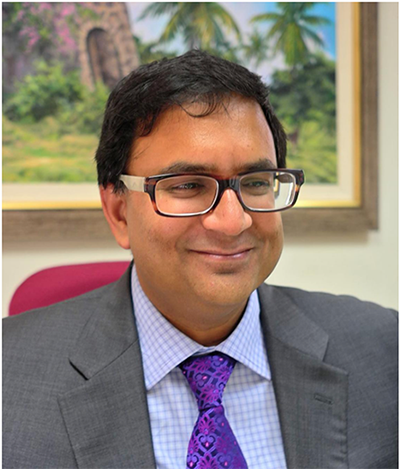The Government advisor charged with setting up a ‘green bank’ by year-end to fund climate-friendly projects is touting a global $50 trillion initiative as the right investment solution to address the climate crisis facing developing countries such as Barbados.
Professor Avinash Persaud, Special Envoy to Prime Minister Mia Mottley on Investment and Financial Services, said that while Prime Minister Mottley got her wish during the COP26 in Glasgow to have a Special Drawing Rights Trust established to fund the climate change initiative, the $50 billion agreed to, was not the right scale.
“She has been lobbying hard for this, and they have agreed to establish a trust of around $50 billion in total. But what we are saying is that it’s a great start, it is like a proof of principle, fantastic, but this is the wrong scale. This needs to add a zero, make it annual and then it would be the right scale,” Professor Persaud said.
So he has formulated a three-prong solution that would primarily involve private sector investments of two-and-a-half trillion dollars per year for 20 years but would not touch the coffers of the various developing states.
He said that having established the “right” scale as the first prong, employment of the private sector must be the second one.
“Because $50 trillion…the governments can’t afford it. So we need to find a way in which we can change the policy regime, incentives and costs; have some blended finance in there to crowd in people’s savings, When I said the private sector we mean people’s savings. The governments don’t have the savings,” he said in an interview with podcaster Dave Erasmus at the Climate Summit in Glasgow.
“The third thing is we’ve taken into account the issue of equity. Equity and development matters. There are a bunch of countries that have contributed to the stock of greenhouse gases; and they are the countries with the resources to deal with it. In fact, the reason why they have resources is because they contributed to the stock of greenhouse gases; there is a direct connect,” the investment expert declared.
Professor Persaud, who was part of the Prime Minister’s team to the COP26, then turned his attention on how best to get these rich nations to make the biggest investment in his plan.
He said while the plan was not costless for them, it would be easy.
The investment method, he explained involved SDRs or Special Drawing Rights.
He explained: “Let’s say you have an SDR. It gives you the right to go along to the United States and borrow money from their Central Bank at the overnight rate. Now the overnight rate is the lower rate because you are only borrowing money for one night. At the moment these overnight rates are near zero per cent. But that right that you’ve got allows it not to be just overnight [but] allows you to roll it over every night.”
Professor Persaud said these SDRs give one the right to go to only a handful of places that make up the SDRs.
He identified them as the US, UK, China and Japan which ironically are the nations that contribute to the greatest stock of greenhouse gases.
“So issuing SDRs of around $500 billion per year would give us the scale we need, it gives us the equity because the people who you are borrowing from are the world’s richest countries who have contributed to the stocks.”
“And what we will say to them is, you could borrow overnight, but on condition that you deliver the savings on greenhouse gases; and the minute your project has not fulfilled that delivery, the overnight stops. So you have that ability to actualise projects that are failing.”
Professor Persaud said that with his plan there is a greater possibility to monitor and control which would not exist if grant money was disbursed for a similar project.
He dismissed any notion that the developing countries could find themselves back into debt again by borrowing from the richer nations to finance the plan.
“They don’t have any fiscal space to borrow. If they borrow, their credit ratings would collapse; they have no ability to do that [borrow]. So the point is that these SDRs would be put into a trust, managed by the Green Climate Fund and the IMF available for any private investor to borrow at SDR rates. So this is not on the governments’ balance sheets.
“This is private investors doing investments that reduce greenhouse gases and if they don’t deliver on the reduction of greenhouse gases the overnight facility ends.”
The Barbadian economist has built up a track record in institutional investment in business and academic circles as a former senior executive at J.P Morgan in its Commodity and Currency Division and a former investment director at leading hedge fund manager, GAM London Ltd. A non-resident Senior Fellow of the Peterson Institute for International Economics in Washington, he is Emeritus Professor of Gresham College in the UK and has been named one of the world’s leading public intellectuals on the 2008 financial crisis by a panel of experts for Prospect magazine in the UK.
(EJ)




